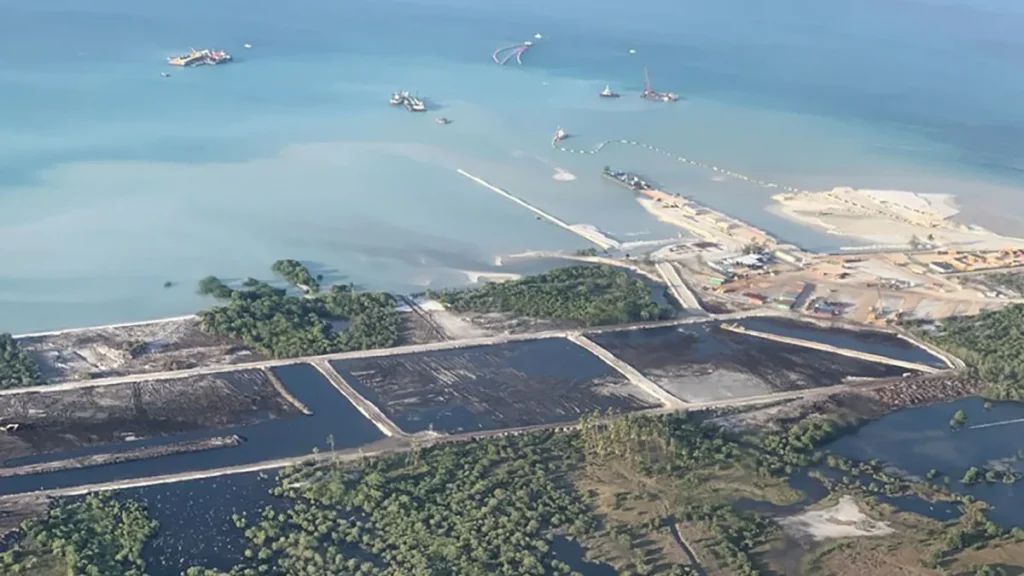- Iman Soerjasantosa, manager of Búzi Hydrocarbons in Indonesia, intends to invest about $120 million in Mozambique to build an advanced Liquefied Natural Gas (LNG) plant.
- Búzi Hydrocarbons owns 75% stake in the strategically positioned Búzi block in Sofala province, Mozambique.
- Fitch Solutions expects Mozambique to lead natural gas production in Sub-Saharan Africa in the next ten years.
Indonesian businessman Iman Soerjasantosa, the manager of Búzi Hydrocarbons in Indonesia, has unveiled plans for $120 million investment in Mozambique. This investment is aimed at constructing a state-of-the-art Liquefied Natural Gas (LNG) plant.
Soerjasantosa says there is a strong willingness of Indonesian companies to invest in Mozambique, a nation that currently boasts a number of ongoing projects, including seismic studies and exploratory drilling, all designed to uncover and capitalize on additional natural gas deposits.
Búzi Hydrocarbons holds a 75 per cent stake in the Búzi block, which is located in Sofala province, Mozambique. This particular block is estimated to house natural gas reserves ranging from 10 to 16 billion cubic feet, with production projected over a 25-year period. Soerjasantosa also shared that since 2019, investments totaling $65 million have already been committed to various facets of this transformative venture.
During the Mozambique-Indonesia Business Forum in Maputo, Soerjasantosa underscored that Indonesian businesspeople are eyeing investments in Mozambique. This commitment to investment and partnership, stretching back to its initiation in 2009, further solidifies the growing relationship between the two nations.
Collaboration and Investment
Álvaro Massingue, the president of the Mozambican Chamber of Commerce (CCM), expressed his aspiration to witness Indonesian companies expanding their business footprint across Mozambique.
Massingue also encouraged local Mozambican entrepreneurs to seize the opportunity to explore investment prospects within the Indonesian market, too. He particularly cited the potential within the technology and financial sectors. This potential was further illuminated through a productive business mission undertaken in Indonesia last year.
The signing of a preferential trade agreement on August 27, 2019, between Mozambique and Indonesia served as a pivotal step towards fortifying trade relations between the two nations.
This agreement, aimed at reducing tariffs and eliminating technical trade barriers, underscores the commitment to foster robust economic ties. The historical trajectory of trade volume between the two countries has witnessed fluctuations, but the overarching goal of enhanced economic engagement remains steadfast.
Mozambique’s Natural Gas Production
In a January 2023 report, Fitch Solutions predicted that Mozambique will take a prominent lead in natural gas production within Sub-Saharan Africa in a decade. Fitch anticipates a surge in gas production from 80.5 billion cubic meters to 135.2 billion by 2032 across the region. Mozambique, alongside Nigeria, Mauritania, and Senegal, will be driving this notable increase in production and subsequent gas exports.
Fitch Solutions underscores Mozambique’s emergence as a notable net LNG producer and exporter, with groundbreaking projects like Eni’s Coral FLNG. However, persistent security concerns in Mozambique’s northern region continue to pose challenges to the operations of energy giants such as TotalEnergies and ExxonMobil.
Within Sub-Saharan Africa, the consultancy underscores the region’s strategic position to harness increased global gas demand, particularly spurred by geopolitical factors affecting traditional gas supply sources.
Infrastructure Expansion
Fitch Solutions cites Mozambique’s strategic plan to develop a new gas import terminal as a linchpin for fostering regional gas demand. Fitch notes that while the initial construction phase involves substantial upfront costs, expanding the liquefied natural gas import infrastructure is essential to stimulate and meet the burgeoning demand for natural gas across the region.
Mozambique has proactively pursued three sanctioned development projects aimed at harnessing the vast potential of natural gas reserves in the Rovuma basin, a rich and promising region.
These initiatives intend to extract gas from the seabed, subject it to liquefaction processes, and facilitate its export via maritime routes. While these projects hold immense promise, security challenges in Cabo Delgado province, have prompted cautious optimism and measured progress.
Since 2017, Cabo Delgado province faces challenges with armed insurgency disrupting various energy projects in the region. TotalEnergies’ project, spearheaded by the Area 1 consortium, experienced an unfortunate suspension following an armed attack in Palma in March 2021. TotalEnergies has, however, expressed its commitment to resume operations only when the security situation allows for safe execution.
Indonesia’s strategic investment aspirations within Mozambique’s burgeoning natural gas sector stand poised to enhance economic cooperation and mutual growth. As Mozambique continues its journey toward becoming a leading force in Sub-Saharan Africa’s natural gas production, partnerships and infrastructure development will play pivotal roles in shaping the region’s energy landscape.
Also Read: Final deal in the works for Tanzania’s delayed $40 billion gas project
